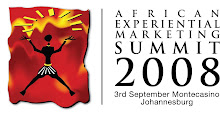This is an article published by Marketing Mix in January 2007.
With below-the-line communications becoming more popular as the focus shifts to the consumer’s experience of a brand, marketers could look to events and experiential marketing for help. “This is especially true for the brands that have limited ATL budgets; they just don’t have enough scale to break through the clutter,” says Abey Mokgwatsane, group marketing director, VWV. Clients are demanding more innovative means through which to engage with the consumer. “Events are the ultimate choice in any communications process as all five senses are applied to communicate the message,” says Nicole de Klerk, general manager, Thebe Events and Productions. While exhibitions are defined as ‘hard sell’ events, experiential events offer a more subtle approach. “If we appeal to a consumer and subtly drive a brand experience into the event, the consumer will understand and see the benefits that the brand has to offer their lifestyle,” says David Boon, CEO South Africa, EXP Agency.
While exhibitions and conferences allow for some form of measurability, experiential events are something of a wildcard. “It is virtually impossible to put a value to an event… If a synergy exists between the event organiser, the client and all of the suppliers, the event will always deliver a return on investment. If the client walks away having pleased the audience, the investment is justified,” says Claudia Eicker, creative director, Creative Directions. Client satisfaction and positive consumer responses are the obvious indications that an event has done well although these are not easily measured in terms of tangible ROI. “It’s an industry worth millions of Rands. However, I hasten to add that it is not a get-rich-quick scheme. Customers are increasingly becoming more value-for-money orientated and they want their Rands’ worth,” says de Klerk. Clients compare both price and value before making an informed decision to ensure that what they see is what they get.
The trend towards experiential campaigns shows no indication of slowing. Analysts are confident that we will see more innovative and interesting event ideas, as well as a focus on interactivity. “Experiential events will demonstrate richer strategic thinking and they will become more measurable. Both of these factors will be driven by the additional resources that will be allocated to experiential. As budgets increase, so too will the need to produce more informed and accountable work,” says Mokgwatsane. He believes that it will become increasingly important for agencies to create experiential divisions if they don’t already have them.
The future looks bright for experiential marketing and it is expected that the event side will become an important part of brand activation. “As marketers we are going to get better at activating brand experiences through a deeper understanding of how consumer brain behaviour works,” says Boon. “The only constraints will be budget and the degree of creativity,” adds Ian Watts, AV development manager, Gearhouse.
With this industry booming, it is comforting to know that legislation, industry standards and ethical practices are healthy. Rowena Hudgson, marketing and PR assistant, EXSA, says that EXSA is currently working with the dti to raise the credibility of exhibitions and to improve industry standards. Guaranteeing the safety of guests is a major local challenge “We have a high level of expertise in our industry… legislation ensures that our safety standards are of the highest quality and that copyrights are adhered to,” says Eicker. The Safety at Sports and Recreational Events Bill, which is soon to be passed, will also have an impact on the industry. While there are many risks that the industry must deal with (including crowd management, new sites and suppliers, high-risk activities and new communication mediums), experienced agencies have policies and procedures in place that effectively manage these. Craig Shapiro, director, Liquid Chefs, says that while alcohol makes it difficult to contro peoples’ actions, you can control how much they drink, for example, or who drives them home. Liquid Chefs barmen are trained to identify guests who have over-indulged and to stop serving them. They also make sure that they have a safe ride home. “Clients should request a list of previous events that have been successfully organised, as well as reference letters from other clients,” says Eicker.
Deadlines and time management loom large amongst the day-to-day challenges that face this industry. “The show must go on, so you have to stick to your deadlines and manage your clients,” says Eicker. Logistical challenges for specialist agencies include factors such as the time lapse between the concept, design acceptance and delivery. “What doesn’t work is when a marketer insists on the WOW factor for the sake of the spectacle. Fit the staging of the event to the rationale – sometimes the simplest idea works best and then the WOW factor happens naturally,” says Robyn D’Alessandro, marketing manager, Gearhouse.
South Africa is well-equipped in terms of events and industry players insist that we are on a par globally. “In terms of design South Africa certainly surpasses many countries,” says Hudgson. Both the venues and target markets are varied. “South Africa’s event industry has the capacity, the know-how and the resilience to stage world-class events,” says de Klerk. Value for money is a major draw card for the international market.
Looking ahead, it seems that there are no limits to what experiential events can deliver. As Mokgwatsane puts it, “The injustice occurs when you limit the scope of experiential marketing to the actual physical experience and when you assume that Experiential Agencies aren’t able to leverage other mediums such as TV, Internet, SMS, direct mail etc, for the purpose of embellishing consumer experiences.”
Tuesday, July 15, 2008
Subscribe to:
Post Comments (Atom)
.jpg)
.jpg)

No comments:
Post a Comment